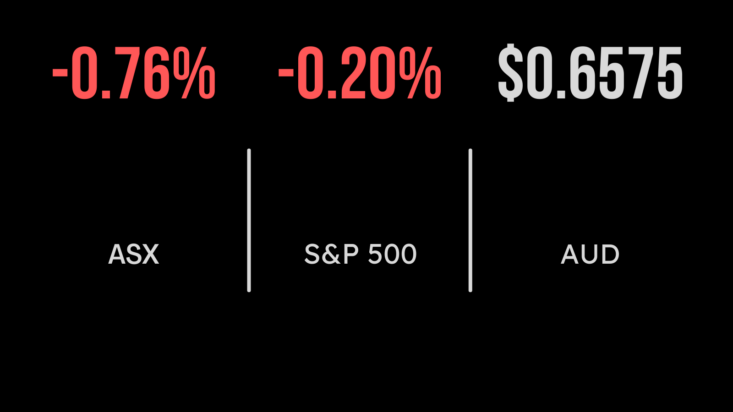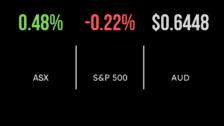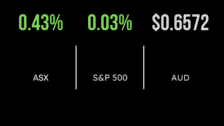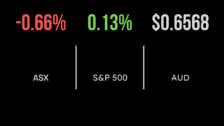Australian miners drag the ASX lower
The Australian share market saw a decline driven by a slump in mining stocks, notably affected by a drop in iron ore value amid concerns about potential intervention by Beijing to stabilise prices. This decline resulted in the benchmark S&P/ASX 200 index dropping by 0.8 per cent, driven primarily by the materials sector’s poor performance, with major players like BHP, Fortescue Metals, and Rio Tinto experiencing declines. Iron ore’s decrease followed a prolonged period of weekly gains, impacted by Beijing’s warnings and discussions surrounding market supervision and inventory handling, leading to a 1.8 per cent drop in Singapore futures. In other commodities, oil stabilised following a three-day decline amid indications that OPEC+ might consider deeper production cuts during its upcoming postponed meeting. Brent hovered near $US81 a barrel after a 2.3 per cent fall in the previous three sessions. Woodside Energy and Santos experienced declines of 0.7 per cent and 0.6 per cent, respectively.
Contrasting Australian company results
In the corporate sphere, amidst this market movement, various companies experienced contrasting fortunes. QBE projected strong growth, witnessing a 2.2 per cent surge, while Healius rose by 2.3 per cent following news of its chairwoman’s decision not to seek re-election. Gold miner Perseus rose after increasing its stake in OreCorp, causing OreCorp shares to plummet. Adore Beauty, the cosmetics retailer, surged by 19.3 per cent to $1.115 following its dismissal of the cash offer ranging between $1.25 to $1.30 a share proposed by British retailer THG. Meanwhile, IGO, a lithium and nickel mining company, experienced a 3.3 per cent decline to $8.45 as it upheld its choice to designate Ivan Vella as CEO, despite scrutinising the events that resulted in his dismissal by Rio Tinto two weeks prior.
US indices, 10-year treasury yields, and monthly returns
On Monday, U.S. shares concluded lower, pausing the robust surge observed across the share market throughout November. The Dow Jones dipped, marking a 0.2 per cent decline. The S&P500 experienced a 0.2 per cent drop, while the tech-heavy Nasdaq Index finished 0.1 per cent lower. November witnessed a substantial uptrend in U.S. stocks, driven by a significant retreat in key borrowing rates. The 10-year Treasury yield declined to 4.388 per cent on Monday, reaching its lowest level in around two months. This came after briefly surpassing 5 per cent in October. An area of concern revolves around the impact of heightened borrowing costs on inflation control by the Federal Reserve, potentially derailing the U.S. economy. Consequently, investors are closely monitoring upcoming economic data, notably the personal consumption expenditure index slated for Thursday, a key inflation metric favoured by FED officials. As of Monday, the Dow saw a monthly increase of 6.9 per cent, while the S&P 500 surged by 8.5 per cent, and the Nasdaq was positioned for an impressive 10.8 per cent monthly gain.
US Company Updates
In company news, Nvidia Corp. and Tesla Inc. saw increases of 1.3 per cent and 0.8 per cent, respectively, as investors maintained their focus on the influential “Magnificent Seven” group, which has been a driving force behind the S&P 500’s upward trajectory this year. Shopify Inc. experienced a notable surge of 5.4 per cent, propelled by robust online holiday shopping statistics. As of early Monday, the stock had soared approximately 55 per cent for November, poised to mark its most successful month on record based on data since 2015. Crown Castle Inc. observed a 4.8 per cent rise following activist investor Elliott Investment Management LP’s call for substantial reforms. These proposed changes include new leadership within the executive and board levels, alongside a comprehensive review of its fibre business. Elliott Investment Management disclosed that the funds it oversees have invested roughly $2 billion in the real-estate investment trust, specifically concentrated on wireless infrastructure.











